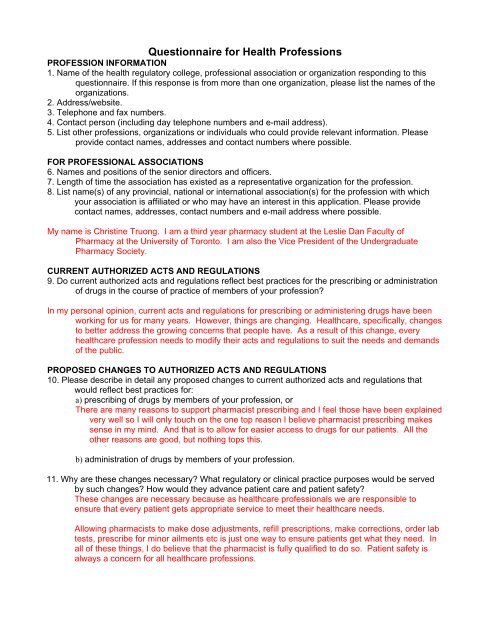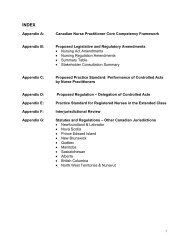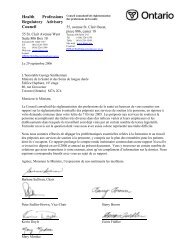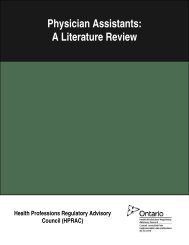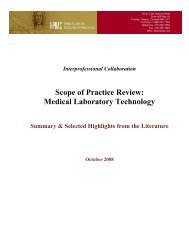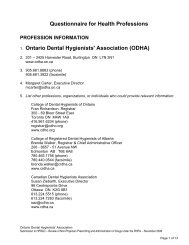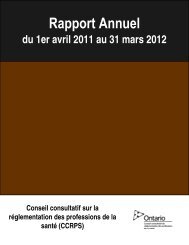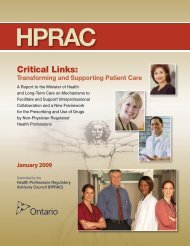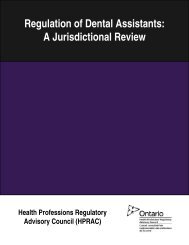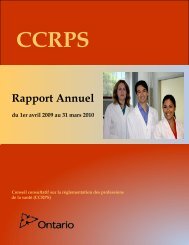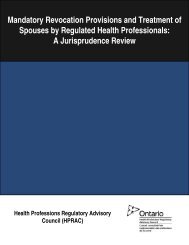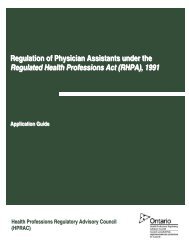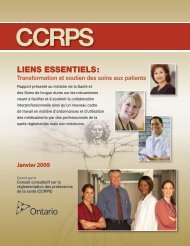Questionnaire for Health Professions
Questionnaire for Health Professions
Questionnaire for Health Professions
You also want an ePaper? Increase the reach of your titles
YUMPU automatically turns print PDFs into web optimized ePapers that Google loves.
<strong>Questionnaire</strong> <strong>for</strong> <strong>Health</strong> <strong>Professions</strong>PROFESSION INFORMATION1. Name of the health regulatory college, professional association or organization responding to thisquestionnaire. If this response is from more than one organization, please list the names of theorganizations.2. Address/website.3. Telephone and fax numbers.4. Contact person (including day telephone numbers and e-mail address).5. List other professions, organizations or individuals who could provide relevant in<strong>for</strong>mation. Pleaseprovide contact names, addresses and contact numbers where possible.FOR PROFESSIONAL ASSOCIATIONS6. Names and positions of the senior directors and officers.7. Length of time the association has existed as a representative organization <strong>for</strong> the profession.8. List name(s) of any provincial, national or international association(s) <strong>for</strong> the profession with whichyour association is affiliated or who may have an interest in this application. Please providecontact names, addresses, contact numbers and e-mail address where possible.My name is Christine Truong. I am a third year pharmacy student at the Leslie Dan Faculty ofPharmacy at the University of Toronto. I am also the Vice President of the UndergraduatePharmacy Society.CURRENT AUTHORIZED ACTS AND REGULATIONS9. Do current authorized acts and regulations reflect best practices <strong>for</strong> the prescribing or administrationof drugs in the course of practice of members of your profession?In my personal opinion, current acts and regulations <strong>for</strong> prescribing or administering drugs have beenworking <strong>for</strong> us <strong>for</strong> many years. However, things are changing. <strong>Health</strong>care, specifically, changesto better address the growing concerns that people have. As a result of this change, everyhealthcare profession needs to modify their acts and regulations to suit the needs and demandsof the public.PROPOSED CHANGES TO AUTHORIZED ACTS AND REGULATIONS10. Please describe in detail any proposed changes to current authorized acts and regulations thatwould reflect best practices <strong>for</strong>:a) prescribing of drugs by members of your profession, orThere are many reasons to support pharmacist prescribing and I feel those have been explainedvery well so I will only touch on the one top reason I believe pharmacist prescribing makessense in my mind. And that is to allow <strong>for</strong> easier access to drugs <strong>for</strong> our patients. All theother reasons are good, but nothing tops this.b) administration of drugs by members of your profession.11. Why are these changes necessary? What regulatory or clinical practice purposes would be servedby such changes? How would they advance patient care and patient safety?These changes are necessary because as healthcare professionals we are responsible toensure that every patient gets appropriate service to meet their healthcare needs.Allowing pharmacists to make dose adjustments, refill prescriptions, make corrections, order labtests, prescribe <strong>for</strong> minor ailments etc is just one way to ensure patients get what they need. Inall of these things, I do believe that the pharmacist is fully qualified to do so. Patient safety isalways a concern <strong>for</strong> all healthcare professions.
12. Are the proposed changes considered part of current routine practice of the profession, andauthorized to members by medical directives, orders or delegation? Please describe. Ifauthorized by medical directives, orders or delegation, is this approach inadequate orinsufficient? Please explain.13. Would the proposed changes result in an enhanced or changed scope of practice <strong>for</strong> theprofession?Of course the proposed changes would change the scope of practice <strong>for</strong> the profession. It isallowing a whole new realm of practice <strong>for</strong> pharmacists.14. Please describe in detail any changes or additions that would be required to the controlled acts thatare now authorized to the profession and what, if any, limitations or conditions should beattached to the authorized act.The controlled acts that should be instigated should come from the same principles that governmedical doctors to prescribe.15. (a) Has the profession submitted a request to the Ministry of <strong>Health</strong> and Long-Term Care <strong>for</strong>changes or additions to the list of drugs that are included in the regulation under the professionspecificact? If yes, please attach copies of the submissions, and indicate when the request wasmade.(b) Are there additions or changes, since the submission was made, that HPRAC should nowconsider? Please describe in detail.(c) If a <strong>for</strong>mal submission has not been made at this time, what are the exact changes you nowpropose to current legislation and regulations?RISK OF HARM16. What additional risk of harm to the patient or client might result from the proposed changes? Howwould your profession manage this risk?In all honesty, I do not see any additional risks with the proposed changes. There have beenpeople who are concerned with pharmacists mis-diagnosing. However, I feel that as anyhealthcare professional, pharmacists know their limitations. If they are unsure of the conditionbrought to them, I have no doubt in my mind that they would recommend/refer the patient to aphysician. This is the same principle as when a patient sees their doctor about a skin conditionthat the doctor is unsure about. He/she will refer the patient to a dermatologist.EDUCATION AND CONTINUING COMPETENCY17. How does your profession require demonstration of competencies <strong>for</strong> pharmacotherapy?If you really have to ask this, then you obviously have no idea what someone does to have tobecome a pharmacist.18. Please provide pharmacotherapy course content in the current educational curriculum anddemonstrate how it ensures the minimum qualifications <strong>for</strong> the prescribing or administration ofdrugs by members of your profession.Please see the Leslie Dan Faculty of Pharmacist curriculum outline.If this is not to your satisfaction, ask any third or fourth year student that is currently in theprogram.19. Does the health professional college require continuing education and training <strong>for</strong> members toensure competency in the prescribing or administration of drugs? Please be specific and providedocumentation to the extent possible. Please describe how the college ensures its memberskeep pace with advancements in pharmacotherapy, pharmacology and patient safety.
Yes, I do believe pharmacists will require continuing education and training. However, ourgoverning body, OCP, already does require pharmacists complete continuing education. As aresult, it will just be additional requirements.20. Please indicate what college documents are available to members on the prescribing oradministration of drugs, including relevant standards of practice, rules and guidelines. Are thesedocuments current? Please include the documents with the submission.21. Please describe current competencies, education and training of members of the profession toper<strong>for</strong>m any of the proposed changes.Please see the Leslie Dan Faculty of Pharmacist curriculum outline.22. Do all members of the profession have the competencies to per<strong>for</strong>m any proposed activity related tothe prescribing and/or administration of drugs?In theory, yes. All members of the profession should have the competencies to per<strong>for</strong>m theproposed activities. However, not everyone wishes to per<strong>for</strong>m these activities. As a result, todistinguish those who do versus those who don’t, there should be a set of competencies thatone should be required to demonstrate be<strong>for</strong>e being allowed to do such activities.23. What effect would the proposed change in the prescribing or administration of drugs have onmembers of your profession who are already in practice?There are numerous changes that would affect the members of my profession who are currentlyalready in practice. As previously stated, many of them will wish <strong>for</strong> things to remain the sameand will not take part in prescribing. On the other hand, many of them do wish to see theprofession change and advance.a) What additional competencies, education and training would be required <strong>for</strong> all (or someadditional) members of the profession to per<strong>for</strong>m any proposed activity?The answer to this question has already been stated.b) How will the members become current with the changes, and how will their competency beassessed?Ideally, assessments on competency should be the same as how medical doctors are assessed.This seems so obvious. But then again, I, <strong>for</strong> one, am not actually sure how doctors areassessed <strong>for</strong> their competency. Are they even assessed?? Does their governing body actuallymake sure they are current with the changes??c) What quality improvement or quality measurement programs do you have in place and whatadditional programs would be put into place?Again, it seems obvious that if you want to give pharmacist additional responsibilities that havealready been established <strong>for</strong> another profession, the QI programs and everything else shouldalso be shifted along side. How would it make sense to govern two professional groupsdifferently when they do the same thing?d) What educational bridging programs will be necessary <strong>for</strong> current members?
There are other provinces in Canada who have successfully implemented the changes you areproposing. As a result, I believe it makes sense to follow their lead and use the sameeducational bridging programs that they did.PUBLIC INTEREST24. Describe how the proposed changes are in the public interest. Please consider and describe theinfluence of any of the following factors or other relevant matters:a) Patient safety,As previously stated, this really shouldn’t be a concern with these changes because there shouldnot be an increase in patient safety.b) Epidemiological trends in illness and disease,Theoretically, they should go do.c) Access to care and coordination of care,There should be tremendous increase to access of care and coordination of care.d) Wait times <strong>for</strong> health care services,The wait times <strong>for</strong> health care services should go down drastically.e) Best practices of the profession,This really should not change. Best practices will be evaluated and determined appropriately,just like how it has always been done.f) Promotion of collaborative practice, andThere should be more collaboration in practice. Especially between doctors and pharmacists.g) Professional competencies not currently recognized.I am more than glad this question was in this survey. Once again, I will en<strong>for</strong>ce my opinion thatthrough the extensive curriculum that pharmacists in Ontario go through to obtain their license,they are indeed competent to carry out the proposed changes recommended. As a result, I thinkthat professional competencies that a pharmacist possess will certainly not go unrecognized ifthe changes are implemented.25. How would the proposed change affect other health professions? The public? Describe the effectthe proposed change in the prescribing and/or administration of drugs might have on:a) <strong>Health</strong> human resources,b) Enhancement of quality of services,c) Access to services,d) Service efficiency,e) Interprofessional care delivery, andf) Other impacts.I feel like <strong>for</strong> me, a pharmacy student, responding to this question is hard because we takecourses on the profession of pharmacy and it’s changes and evolutions. Mind my use of theword, but we are often “brainwashed” by what those who teach us think. There<strong>for</strong>e, anything I
say to answer this question has already been stated by pharmacists, professors of pharmacy,members of the board who are proposing these changes.26. Are members of your profession in favour of the proposed changes? Please describe anyconsultation process and the response achieved.How can you ask this question? There are going to be members who support and are in favourof the changes, but there are always going to be members who do not support and are opposedto the change.PRESCRIBING: DRUG REGULATIONS UNDER PROFESSIONAL ACTS27. Please describe challenges faced by members of the profession as a result of listing specific drugsin regulation schedules made under the profession-specific act.28. If classes of drugs, rather than a list of specific drugs, were included in the proposed regulations,please describe how this would impact the members of the profession and the college. What, ifany, additional education and training, competency review, or updates to clinical guidelines orstandards of practice would be required?29. If classes of drugs, rather than a list of specific drugs were included in the regulation, whatconditions should be attached, if any, to the classes? Should the broad purpose, indications, orsome other reference be specified (e.g. <strong>for</strong> pain relief in labour; <strong>for</strong> smoking cessation; <strong>for</strong>treatment of sexually transmitted diseases; in emergency; refill). Please comment in detail.30. If classes of drugs, rather than a list of specific drugs were included in the regulation, how would youclassify the drugs <strong>for</strong> your profession? Are there circumstances where a drug class would not beappropriate in a regulation schedule <strong>for</strong> the profession? Are there situations where acombination of class and list of specific drugs would better respond to the competencies of theprofession?31. If applicable, please describe in general your profession’s experience with requests <strong>for</strong> changes todrug regulations, including specifics of the requests made, regulation changes that followed, ifpossible the time required <strong>for</strong> changes to regulations, and what, if any, proposed changes were,or were not, approved by government.COLLABORATION32. Do members of your profession practice in a collaborative or team environment where a change indrug regulations or legislation would contribute to multidisciplinary health care delivery? Howwould relations between professionals working in a team be impacted?What additional standards would be required (e.g., record-keeping, referral protocols)?Please describe any consultation process, agreements or other arrangements that haveoccurred with other professions.Yes, there are many pharmacists who practice in a collaborative and team environment wherethese changes will affect them. I think the relations between professions should improve andteamwork will be enhanced.OTHER JURISDICTIONS33. Describe any obligations or agreements on trade and mobility that may be affected by the proposedchanges <strong>for</strong> the profession. What are your plans to address any trade/mobility issues?34. What is the experience in other Canadian jurisdictions? What is the experience in internationaljurisdictions?COSTS AND BENEFITS35. What are the potential costs and benefits to the public and the profession of the proposed changes?Please consider and describe the economic impact, costs and benefits to:
a) patients,They benefit in so many ways that it is impossible to list. They will have faster access to care.The pharmacist will be able to fix corrections <strong>for</strong> the patient made by physicians on prescriptions.They will be allowed to refill prescriptions <strong>for</strong> patients so the patient is not required to go andmake an appointment to wait an hour in the waiting room so they can see their doctor <strong>for</strong> 2minutes.b) broader health care service delivery system,Because individual patient care is improved, the whole system will be.c) educational sector,d) regulatory sector, andPerhaps more regulations will be set <strong>for</strong>th. But as previously stated, it can easily be done bytaking the model from physicians and adjusting it appropriately to fit pharmacistse) the profession.ADDITIONAL INFORMATION36. Is there any other relevant in<strong>for</strong>mation that HPRAC should consider when reviewing yoursubmission?I am writing this from the perspective of a pharmacy student. I will admit there are many things Ido not know and there are many things that I will learn.At this point in time, I am not even sure I fully support the changes proposed. I just know that Ido believe pharmacists are capable of carrying out the changes. And I know that most of theobjections to these changes have no real foundation. Especially to the idiotic ones that questionif pharmacist should be able to prescribe medications <strong>for</strong> smoking cessation. Who’s to saydoctors don’t already do the things that people are suggesting pharmacists ‘might’ do?Moreover, in some ways, I do believe things are fine the way they are. Medical doctors havebeen prescribing <strong>for</strong> years now and pharmacists have been dispensing <strong>for</strong> years. Is it reallynecessary to change this? I don’t know.Another thing that boggles my mind is the evolution of these two professions. Pharmacy is aprofession that came about from medicine. Back in the day, be<strong>for</strong>e pharmacy existed, doctorsdid the prescribing AND the dispensing. The profession of pharmacy came about becausepeople believed there might be a conflict of interest with one person prescribing dispensing.This, evidently, is something that has resurfaced and made many of us wonder. So now I ask,by instigating these new and improved changes to the profession of pharmacy, are we just goingback in time?In conclusion, those are my thoughts. Thank you <strong>for</strong> reading my viewpoint on this matter.Sincerely,Christine Truong


